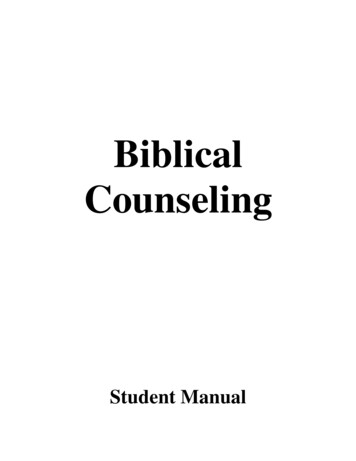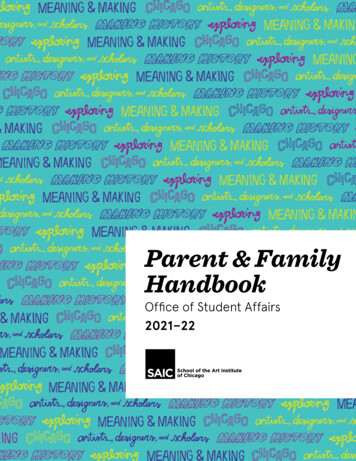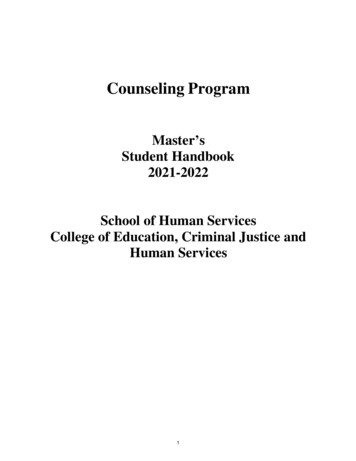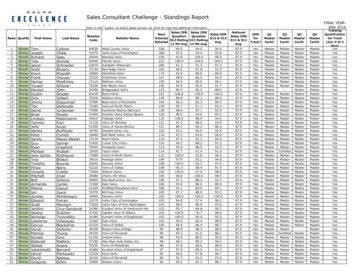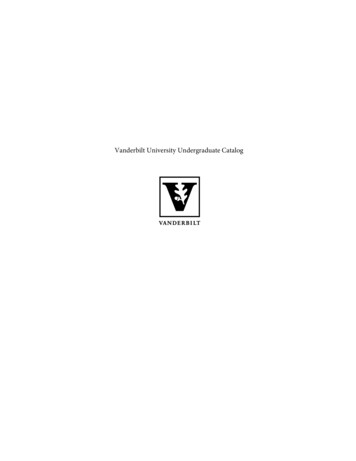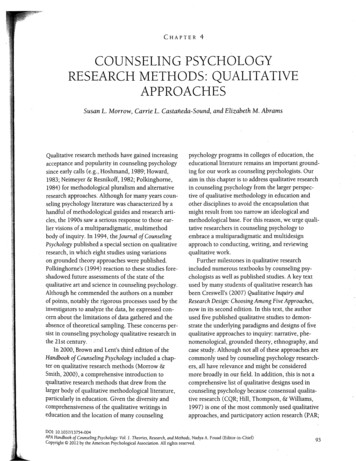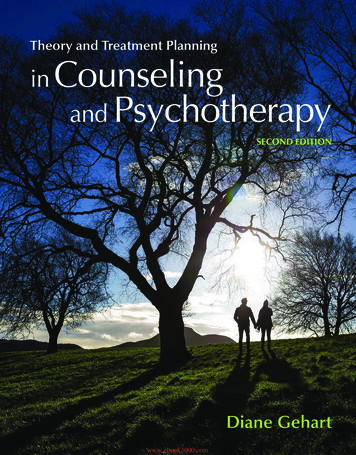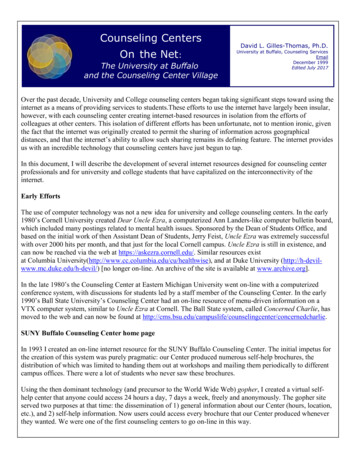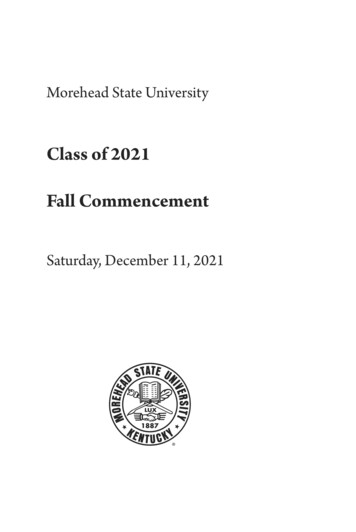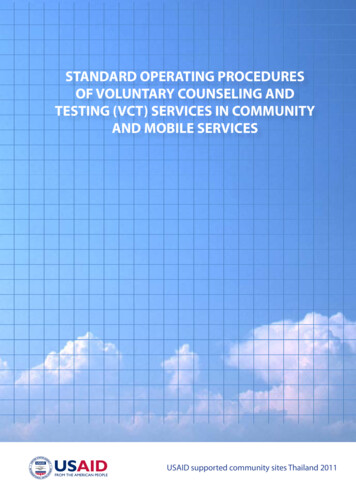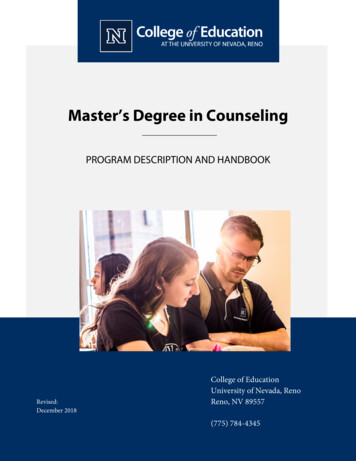
Transcription
Master’s Degree in CounselingPROGRAM DESCRIPTION AND HANDBOOKRevised:December 2018College of EducationUniversity of Nevada, RenoReno, NV 89557(775) 784-4345
2ABOUT USThe Reno AreaAs Nevada’s flagship land-grant institution, the University has beeninstrumental in the history of the nation’s fastest‐growing state.One of the top 150 research universities in the country, theUniversity of Nevada, Reno is fully accredited by the NorthwestAssociation of Schools and Colleges, the official accrediting agencyof most Western states.Channeling the crystal waters of LakeTahoe, the Truckee River runs leisurelythrough downtown Reno. Numerousmountain ranges rise ruggedly fromthe desert basin, providing stunningviews and unmatched sunsets.The University of Nevada, Reno was founded in 1874 as the StateUniversity of Nevada in Elko, Nevada, about 300 miles northeast ofits present-day campus in Reno. The site for the universitypreparatory school in eastern Nevada (where no state institutionshad previously been located) proved to be impractical, as nearly halfof the state's residents lived in the Reno-Carson City area. In 1885,the legislature approved the move of the University from Elko toBoasts a fitness facility of more Reno.The University than 108,000 square feetOffers affordable, top-tiereducationHouses one of nation’s mosttechnologically advancedlibrariesProvides students theopportunity to work closelywith research faculty andprofessionalsIn the last 35 years, the University has met the challenges ofleadership in what is now the fastest-growing state in the country,with student enrollment rising to more than 21,000 in fall 2016.Most recently, the university replaced the Jot Travis Student Unionwith the Joe Crowley Student Union, one of the mosttransformational buildings ever built on campus. This 167,000square-foot, "green" environmentally friendly facility signals a shiftin campus expansion, offering the campus and community a new
3centrally located "front door" to the University from Virginia Street. In 2008, one of the nation's mosttechnologically advanced libraries, the Mathewson-IGT Knowledge Center, opened next to the CrowleyStudent Union, further signaling the campus' move north. In 2016, the new 78,000 square foot WilliamN. Pennington Student Achievement Center opened to provide a central building for all student servicesand in 2017 the university broke ground for a new arts center. The university’s most recent buildingaddition is the E. L. Wiegand Fitness Center. The new fitness facility is more than 108,000 square feetwith three basketball gymnasiums, areas for weightlifting, cardio training, mind-body training, a fitnessstaircase, 1/8th mile running track and a multitude of new fitness classes and activities.The University of Nevada, Reno is an affordable Tier One university. Our students pay 80 percent lessthan the average Tier One institution, making UNR a best buy amongst Tier One universities. Unlikemany public research universities, the University of Nevada, Reno offers its students the chance to getup close and personal with highly credentialed faculty, researchers and professionals. Ph.D. professorsregularly teach undergraduate students and invite them to research labs or internships. Graduatestudents work closely with professors on major research projects while developing their own researchskills and projects. UNR Faculty are world renown, respected members of their fields and often bringhome research and career achievement awards.Along with its academic benefits, the University of Nevada, Reno is a beautiful campus located in oneof the most picturesque areas of the country. From the 100-year-old, elm tree-lined Jeffersonian quad tothe state-of-the-art Mathewson-IGT Knowledge Center, the campus possesses historic beauty anddigital convenience alike. Nestled at the base of the Sierra Nevada, the city of Reno is closer to cities suchas Sacramento and San Francisco than Las Vegas. In contrast to Las Vegas, Reno offers its residents aninvigorating taste of all four seasons.Channeling the crystal waters of Lake Tahoe, the Truckee River runs leisurely through downtown Reno.Numerous mountain ranges rise ruggedly from the desert basin, providing stunning views andunmatched sunsets. Located on the border between the Great Basin and the Sierra Nevada, Reno hasbeen dubbed "America's Adventure Place" for its impressive and diverse geographic offerings. Withcrystal clear Lake Tahoe 30 minutes to the west, the barren Black Rock Desert to the northeast, andYosemite a short road trip to the southwest, Reno is a great destination for nature lovers and adrenalinejunkies alike.Reno offers a favorable quality of life that has been recognized by numerous national sources, includingForbes magazine. Reno’s population enjoys an array of cultural activities, including museums,numerous theatre companies, a symphony, ballet and opera. There are several major venues forconcerts, sporting events and other live performances, including the Lawlor Events Center on campusand the Reno Events Center, located less than a 10-minute walk from campus. In recent years, Reno hasexperienced a Bohemian cultural renaissance, with a growing arts community, increasing internationalflavor and the annual counterculture festival, Burning Man.
4INTRODUCTIONThe purpose of this handbook is to provide information concerning programs, departmental policies, andthe procedures required to obtain a counseling degree from the University of Nevada, Reno. This handbookshould be used in conjunction with the University of Nevada, Reno General Catalog. Please contact youradvisor or another faculty member if you have questions not answered in the Handbook. While all effortshave been made to provide you with comprehensive, up to date information, this handbook cannot be usedas a substitute for the UNR Catalog or Graduate School policy and academic handbook. Please consult thoseresources for the most up to date and accurate information; please be aware that university policies takeprecedence over college or departmental policies. The Counseling Student Handbook is in effect for oneyear, and students should access new Handbooks online each year. Program faculty reserve the right toadjust policy and curricular changes on an ongoing basis, with students notified in classes and/or via email.Students are protected from mid-program curricular adjustments that might otherwise lead to extendedgraduation dates by the filing of a Program of Study.PART I: PROGRAM FOUNDATIONSAccreditationThe University of Nevada, Reno is accredited by Northwest regionalaccreditation body. The College of Education undergraduate program isaccredited by the National Council for the Accreditation of TeacherEducation (NCATE). The counseling programs in School Counseling,Marriage and Family Counseling, Clinical Mental Health, and the doctoralstrand in Counselor Education and Supervision are currently accredited bythe Council for the Accreditation of Counseling and Related EducationalPrograms (CACREP) until 2024.Program DescriptionThe counseling program within the College of Education offers a master’s degree (M.A.) in Counseling withthree possible majors: 1) School Counseling; 2) Clinical Mental Health Counseling; and 3) Marriage andFamily Counseling. School Counseling is the recommended major for students who wish to work inelementary, middle, high school, or alternative school environments. Clinical Mental Health Counseling isthe recommended major for students desiring careers working with community members in mental healthcenters, agencies, non-profit organizations, and state or federal government environments. Marriage andFamily Counseling is the major recommended for students who wish to counsel couples and families in theprivate practice arena.In addition, the Ph.D. in Education: Counselor Education and Supervision is offered to students who haveearned master’s degrees in counseling from CACREP accredited programs and have the career goal to
5pursue either leadership roles in counseling organizations or counselor education faculty positions. Formore information regarding the doctoral program, see the Counseling Doctoral Student Handbook.The Academic UnitThe Counseling Program is housed inside the College of Education in the Professional Specialized Studies.The program unit is called Counseling and Educational Psychology (CEP). All degrees offered throughCEP are clearly identified as part of UNRs graduate degree offerings. CEP is the only unit on the UNRcampus preparing School, Marriage and Family, and Clinical Mental Health Counselors. In addition toCEP, CASAT offers coursework in Addictions, an area of interest to many Counseling students.Mission StatementThe mission of the UNR counseling program is to educate competent, culturally aware, ethical counselorswho will provide exceptional services in both public and private settings to meet the needs of an increasinglydiverse society.Vision StatementIn keeping with the science/practitioner tradition, the degree offerings of UNR’s Professional CounselingProgram strive to prepare students to be exemplary professionals with the abilities and competencies tothrive as professional counselors. The curricular and field experiences emphasizes developmentalassessment through continuous student and program evaluative feedback, and strives to prepare counselorsto serve diverse populations our contemporary society.The program offers intensive studies that stress skill training and clinical preparation and an approach ofproviding mental health and human development principles to address wellness, personal growth, careerdevelopment, and emotional flourishing. Education and training are oriented toward strengths-centered,rather than an illness-centered approaches.ContextThe Counseling Program, as a component of the state’s Land Grant University and the College ofEducation, is responsible for providing quality professional programs for students preparing to becounselors in educational and community settings. Masters emphases are offered in clinical, marriage andfamily and school counseling, and a doctoral emphasis is offered in counselor education. The CounselingProgram fosters creative and scholarly activities, and encourages and supports faculty and graduate studentresearch in the application of that research to state and national problems. The Counseling Program supportstate and national counseling professional organizations, and is dedicated to encouraging students todevelop a strong counseling professional orientation.In carrying out its mission and vision the Counseling Program resolves to:
6 Offer quality graduate degrees and emphases.Accentuate graduate and professional programs that meet the education needs of the citizens ofNevada.Emphasize doctoral level research and organized research programs in counselor education.Provide undergraduate education programs and students with background knowledge and skillsrelated to counseling.Offer selected community and public service programs in counseling.Contribute to the advancement and dissemination of knowledge in counseling, and counseloreducation that will help improve society at the state, regional, and national levels.Reflect and respect the rich ethnic and cultural diversity of the citizens of Nevada in academicresearch and service initiatives.Licensure and CertificationFor the purpose of facilitating a smooth transition from the academic to the professional arena, the UNRCounseling Program has aligned curricular experiences and requirements with the State of Nevadalicensure entities and with certification with the National Board of Certified Counselors. The MFC programis aligned with eventual licensure as an LMFT; the CMHC program is aligned with eventual licensure as aCPC; and the School Counseling program is aligned with licensure as a Nevada School Counselor. Whilethe program makes every effort to align the curricular experiences with licensure, eligibility for licensure isa student responsibility and licensure is a relationship between the various boards and the individual, notthe academic program. Therefore, students are expected to be aware of licensure requirements andadjust their professional activities accordingly. The University of Nevada, Reno does not have theauthority to guarantee licensure to counseling graduates. In addition, students should be aware thatlicensure is a state-to-state process. Students interested in becoming licensed in other states should checkthe eligibility requirements of the other state early in their UNR academic program, and bring thisinformation to the attention of their academic advisor. When asked, advisors will assist students to aligntheir programs of study with other state licensure laws to the extent possible.The specific process and criteria for licensure in the State of Nevada as well as NBCC certification will bepresented in required counseling courses.
7PART II: PROGRAM OBJECTIVES, KEYPERFORMANCE INDICATORS, STUDENTDISPOSITIONS, AND STUDENT/PROGRAMASSESSMENT PROCESSESCounseling Program ObjectivesCounseling program objectives are built upon the program mission statement and are designed to bemeasurable. Student learning outcomes, shown in the syllabi for all courses, are identical to or reflect thecounseling program objectives.Program Objective #1: DispositionsFrom admission through exit students will demonstrate the attitudes, characteristics, and behaviors definedby the program as characteristic of exemplar counseling professionals.Program Objective #2: Ethical PracticeStudents will demonstrate the capacity to practice counseling from a strong foundational understanding ofethical and legal issues, intentionally integrating counseling ethical practices into day-to-day professionalactivities.Program Objective #3: Social and Cultural DiversityIn keeping with the ACA multicultural competencies, students will develop self-awareness, knowledge, andskills to prepare them to be contemporary, relevant, and culturally informed practitioners in clinical,marriage and family, and school counseling settings.Program Objective #4: Human Growth and DevelopmentStudents will demonstrate knowledge of lifespan development and the capacity to integrate knowledge ofdevelopmental theory into practice.Program Objective 5: Career DevelopmentStudents will demonstrate competence in understanding the world of work and the relationship betweenmental health and life roles such as work, school, and home.
8Program Objective #6: Counseling and Helping RelationshipsStudents will gain an understanding of the theories and research related to helping relationships, and willdevelop the skills to apply their knowledge in professional, therapeutic relationships.Program Objective #7: Group Counseling and Group WorkStudents will demonstrate knowledge of group process dynamics, group counseling, and group work,including group theories, stages of group, leadership styles, and therapeutic factors.Program Objective #8: Assessment and TestingStudents will demonstrate a broad understanding of validity and reliability of assessments, the selection anduse of assessment tools, client assessment and diagnosis, trauma assessment, and the assessment of selfinflicted harm and danger to others.Program Objective 9: Research and Program EvaluationCounseling students will demonstrate the capacity to select, analyze, and apply research to inform practice,including evidence-based practices and theory based interventions appropriate to their designated settingand personal theoretical orientation.Program Objective: Clinical Mental Health CounselingClinical Mental Health Counseling students will demonstrate an understanding of foundational knowledge(such as psychological testing), contextual factors (such as trauma, co-occurring disorders, poverty, andculture), and the demonstration of competence in clinical mental health fieldwork.Program Objective: Marriage, Couple, and Family CounselingMarriage, Couple, and Family counseling students will demonstrate an understanding of foundationalknowledge (such as family systems theory and assessment), contextual factors (such as trauma,intergenerational influences, and culture), and the demonstration of competence in the practice ofmarriage, couple, and family counseling.Program Objective: School CounselingSchool counseling students will demonstrate an understanding of foundational knowledge (such as modelsof school program development and school assessment), contextual dimensions (such as the roles of schoolcounselors, signs of substance abuse, and effective school leadership), and the demonstration of competencein the practice of school counseling.Note: Doctoral Program Objectives are located in the Counseling Program Doctoral Student Handbook
9Key Performance IndicatorsKey Performance Indicators (KPIs) are aspects of the Program Objectives that are being measured duringa given cycle. KPIs are directly associated with one or more CACREP standards, and are usually denotedas either a Knowledge measure (what you know) or a Skill measure (what you can do). Students must passall KPIs to graduate from the UNR program; successfully passing all courses will not lead to graduationunless all KPIs have been passed and other exit criteria passed or completed. (See Exit Criteria in thismanual.) KPIs for the core are noted in the following charts as well as in the relevant course syllabi.KPIs for the three program areas with be explained in program specific courses and are noted on coursesyllabi.CACREP standards covered in courses but not measured in this round of the assessment plan are notedunder the “Content” heading in course syllabi.Student DispositionsAs indicated in Program Objective #1, students are screened at admission and checked at gates to ascertaintheir demonstration of the following student dispositions. The dispositions below are agreed upon by theUNR counseling faculty as representing dispositions we desire in students because they will serve thestudents well in the professional counseling field.Conscientiousness - The ability to plan, deliberate, persevere, and demonstrate evidence of self-discipline,a strong sense of responsibility, and a preference toward planning.Self-Awareness - A conscious knowledge of one’s own traits, character, motive patterns, emotions, andbehavior, evidenced by depth of self-understanding.Coping and Self-Care - Engages in appropriate levels of self-care. Identifies and responds appropriately topersonal stress, burnout, situational impairment, loss, trauma, medical issues, and crisis. Uses positivecoping and stress management mechanisms.Interpersonal Skills - Engagement with the external world, capacity to interact effectively with others,energy in interpersonal relationships, and warmth. Capacity to demonstrate state extroversion. Ability todeal appropriately with conflict.Legal, Ethical, and Professional - Integration of professionalism and ethical standards into day-to-daybehavior. Behavior conveys the ability to judge the rightness or wrongness of actions and act upon thejudgment. Except in rare circumstances, upholds rules, policies, and laws.
10Emotional Stability - Ability to control negative emotions (such as anger and anxiety) and adopt a generallypositive perspective; effective management of psychological dysfunction and/or excessive emotionalreactions that could potentially interfere with professional functioning.Honesty - Academic honesty; reliable and truthful in dealings with others; engenders public trust.Critical Thinking - Demonstrates fairness in behavior toward others. Flexibility in problem solving and awillingness to abandon nonproductive strategies. Demonstrates the ability to analyze and synthesize.Openness - Tolerance for ambiguity; tolerance for the culture and lifestyle differences of others;imaginative; curious; open to new experiences; intellectually interested and engaged.Cultural Sensitivity – Behaviors that suggest tolerance for the culture and lifestyle differences of others;cultural sensitivity to the multiple possible factors that make up an individual’s identity; aware of one’s ownheritage and the impact on others.Cooperativeness – Behaviors that suggest cooperation, such as working well with authority figures; avoidinginappropriate competition or power struggles; accepting influence from supervisors and other experts; ageneral display of helpful behaviors; collaborative.Student/Program Assessment ProcessesThe dispositions above are assessed at five gates in the program:Gate 1: AdmissionsGate 2: Completion of Pre-Practicum, CEP 600, and Counseling TheoriesGate 3: Completion of PracticumGate 4: Completion of first semester InternshipGate 5: Program ExitStudents are given feedback on their performance on the student dispositions as well as KPIs at each gate.In addition, when dispositional issues arise between gates faculty file a form called aRed/Yellow/Blue/Green. This process initiates a faculty meeting to discuss the individual student anddetermine if the student needs additional support, remediation, suspension, or dismissal from the program.While some concerns require remediation, other concerns may require suspension or dismissal withoutremediation. The purpose of the gate checks is to give students early and ongoing feedback, as well as toprovide the counseling faculty with a process to screen the profession, per the ethical requirements of theAmerican Counseling Association.
11PART III: STUDENT EXPECTATIONS,REQUIREMENTS, AND POLICIESExpectations for Students1. Students are expected to follow the ACA code of ethics and the ethical codes of other relevantcounseling professional organizations and Nevada state law from matriculation to exit.2. Students are expected to undergo a self-designed program of growth and development—bothpersonal and professional-- while enrolled in the program. This could include participating inseminars, workshops, or other activities that contribute to personal and professional growth. Facultymay offer formal or informal suggestions, but students are expected to be dedicated to their ownpersonal and professional growth.3. Students are expected to show respect for cultural differences. Students have first amendmentrights and are encouraged to speak their opinions and engage in meaningful dialogue, but areexpected to do so in a way that respects the lifestyle and cultural differences of other students andfaculty.4. Though not all classes take attendance, students are expected to regularly attend classes and fieldexperiences.5. Students are encouraged to communicate with faculty directly when conflicts occur. It is expectedthat counseling students will avoid pulling other students into their conflicts. Similarly, when peerto-peer conflicts occur, professional behavior is expected of students.6. Students are expected to know and follow the policies and procedures in the Counseling StudentHandbook, as well as the policies and procedures of the University of Nevada, Reno and theGraduate Catalog.7. Students are expected to dress professionally when engaged in field site activities.8. Students are responsible for meeting deadlines, completing all UNR forms, and for making advisingappointments when they need assistance with advising. Faculty advisors are not responsible for anadvisee missing deadlines.9. Students are expected to engage in activities of professional counseling organizations while enrolledin the program.
12Matriculation PoliciesPer the graduate catalog, after admission students must maintain certain enrollment and certain academicstandards. Please see the Graduate Catalog for specific details on continuous enrollment and leave ofabsences policies.Policy for Retention, Remediation, and DismissalIn keeping with the ethical guidelines of the American Counseling Association and state counseling law,counselor education faculty are ethically mandated to screen the profession from students who showinadequate student competence or dispositional issues. (See Gate Checks). In some cases students will beinvited to remediate these issues, however, if the faculty deem that remediation is unlikely to be successfulstudents may be suspended or dismissed from the program for academic, dispositional, or field workproblems. In these situations student have due process available to them. See the Counseling StudentHandbook section on Appeals.Assigned AdvisorsAs indicated in your admittance letter, counseling students have an assigned advisor at all times during theprogram. Your advisor will help you develop your Program of Study. If you do not know the name of yourfaculty advisor, please ask the CEP Program Assistant.Professional Counseling OrganizationsStudents are expected to identify with the counseling profession by participating in professional counselingorganizations. See Exit Requirements.Exit Criteria for Graduation from the ProgramIn order to graduate from the UNR Counseling Program, students must meet the requirements of the UNRGraduate School and successfully complete the program requirements. Students are required to keep recordof their Exit Criteria Activities on the Exit Criteria Check list. Faculty signature is required for each activitylisted. The Exit Criterial Checklist is to be submitted with the Notice of Completion (discussed below) Theexit criteria are listed below:1. Completion of all required courses and field experiences (including 600 clock hours of Internship)with a B or Better grade point. A pass in Internship and a cumulative grade point average of 3.0 isrequired to graduate from the counseling program.
132. Passing all KPI and Dispositional Requirements. Regardless of grades in the course, students arerequired to pass all dispositional student learning outcomes, CORE student learning outcomes, andstudent learning outcomes for their specialty area. Students may not graduate from the programwith an unresolved “red” on the Red/Yellow/Green forms filed by faculty members. Students willbe required to earn at least “Expected Target” on all identified key performance indicators and keyassignments. These assignments are a sample of the knowledge and skill expectations of theprogram, and are aligned with the standards of the Counsel for the Accreditation of Counselingand Related Educational Programs (CACREP). If a student does not earn “Expected Target” theywill be given a remediation opportunity, asked to retake the course, suspended from the program,or dismissed from the program.3. CPCE Examination. The comprehensive content exam is the Counselor PreparationComprehensive Examination, which must be passed at the level required by the program. NCE,while important for licensure, is not the exam used for graduation from the program. The CPCEconsists of 160 items, multiple choice, with 17 items per the eight CACREP areas of: (1) Humangrowth and development, (2) Social and cultural foundation, (3) Helping relationships, (4) Groupwork, (5) Career and lifestyle development, (6) Appraisal, (7) research and program evaluation, and(8) Professional orientation and ethics. The CPCE is similar in content and format to the NationalBoard of Certified Counselor (NBCC) National Counselor Examination (NCE). The average scoreof the pool of examinees nation wide determines the CPCE minimum passing score. The exam hasa total possible of 136 correct answers. The examination fee for registering, scoring, and handlingis approximately 100 per student. The CPCE will be taken in the fall semester prior to Maygraduation. The program will send out an email with detailed information about registering for thetest. The fees are to be paid upon enrollment for the test. There is no “class” in which to enroll forthe semester students take the CPCE (Fall). If students are not successful in passing the exam, theywill be required to register, pay and take the test again in the spring semester. The NCE will bescheduled and offered in the Spring semester. Pending NAC changes considered, it is suggestd youtake the NCE at that time.4. Student Symposium. In the spring semester, prior to graduation, students will attend and presentat a symposium held by the UNR Counseling Program. The date for this event will be given tostudents as soon as possible. At this event, students will be required to create a professional posterpresentation. The topic of the poster should be something related to the student’s counseling track.The poster should include reseach and should use professional references. Students should beprepared to talk about their research poster with attendees. The posters will be evaluated by facultyand by the students’ committee members. There will be an informational meeting to orient studentsto prepareing and presenting a professional poster. All students applying applying for Maygraduation at the M.A. level must register for CEP 795 (1-3 credits) in the Spring semester in whichthey present at the symposium. Credits are determined by student need. Most students enroll in 1
14credit of CEP 795, however, sometimes it is necessary for students to enroll in more credits forfinancial reasons or to retain graduate standing.5. Membership in a Professional Organization and Professional Insurance. Beginning withenrollment in the course, Pre-Practicum in Counseling, students must be a member of aprofessional organization in counseling. Recommendations are ACA, ASCA, IAMFC, or AAMFT.Also required is professional liability insurance, generally available to members for a drasticallyreduced fee.6. Professional Organization Contribution. While enrolled in the program students are required (asan exit criteria) to make a contribution to a professional organization. Faculty recommendsactivities such as serving on a committee, assisting with a conference, or serving as a studentrepresentative. In lieu of this requirement, you may also co-publish an article with a facu
University of Nevada, Reno is fully accredited by the Northwest Association of Schools and Colleges, the official accrediting agency of most Western states. The University of Nevada, Reno was founded in 1874 as the State University of Nevada in Elko, Nevada, about 300 miles northeast of its present-day campus in Reno. The site for the university
